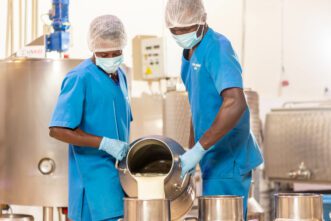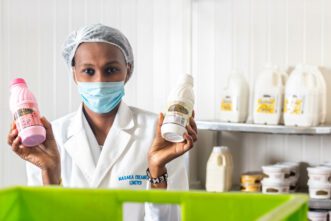Masaka Creamery’s Mission: Everyone Is Made in God’s Image
In much of Africa, so-called disabilities are considered to be a curse, and individuals with special needs tend to be shunned as outcasts. But the creamery’s example of employing deaf people demonstrates that “every individual is created in the image of God,” Porter said.
By removing obstacles and setbacks for these ready-and-willing workers, the business spreads the word that they have special skills to contribute. “They might be differently abled, but they’re not less capable,” Porter said of factory employees.
Clarisse Uwimana, who works on Masaka Creamery’s yogurt production line, puts it this way: “God has gifted us with different talents. You can be deaf but be capable of doing great things,” she said. “There is no difference between a deaf person and someone who can hear and speak. I can do anything and make friends with anyone. I can also help anybody based on their needs.”

Through sign language, Uwimana told an interpreter that her family didn’t care about her and ignored her, making her feel unwanted. “It broke my heart to be looked down upon because I am deaf,” she said. “But coming [to Masaka Creamery] and meeting other youth with the similar disabilities has brought joy into my life.”
Her coworker Henriette Mutegaraba, who said she can now afford rent and food, put it this way: “My life is as good as other Rwandans.”
Before being hired at Masaka Creamery, some of the deaf and hard-of-hearing people don’t know sign language, and many aren’t able to read. But once they’re surrounded by fellow employees using sign to communicate, they pick up the language quickly.
Porter’s staff works with Rwanda’s National Union of the Deaf for additional training. And Masaka Creamery partners with the country’s National Council for People With Disabilities to support members of the hearing-impaired community in other ways.
Sign language is quite easy to learn, Porter said, especially compared to Kinyarwanda, the Bantu language that’s spoken in Rwanda. In fact, after more than a decade in the country, the businessman’s Kinyarwanda remains limited, but he has become proficient in Rwandan Sign Language.

Abolishing the Sacred-Secular Divide
Bryan Chrisman, senior advisor at the Impact Foundation, described Porter as “a role model for a new generation of entrepreneurs.” In Chrisman’s job helping investors and generous donors multiply the impact of financial gifts, he constantly sees God at work. “Givers are realizing they can use their charitable capital to invest worldwide,” he said.
For Chrisman, Porter’s work with Masaka Creamery exemplifies the “redemptive nature” of combining profit with purpose. “Entrepreneurs are wanting to do something impactful for the Lord,” he said, “and here’s someone with relatively little means who made something, is creating jobs, and is really serving the poor.”
What does Porter want people to take away from his experience in Rwanda? First, “there is no sacred-secular divide,” he said. Second, he doesn’t want people to hear his story and assume they need to go to the developing world to do business.
“I don’t think that’s the point God is making through my life,” Porter said. “I think the point is that God wants to partner with us in whatever assignment he’s given us.”

